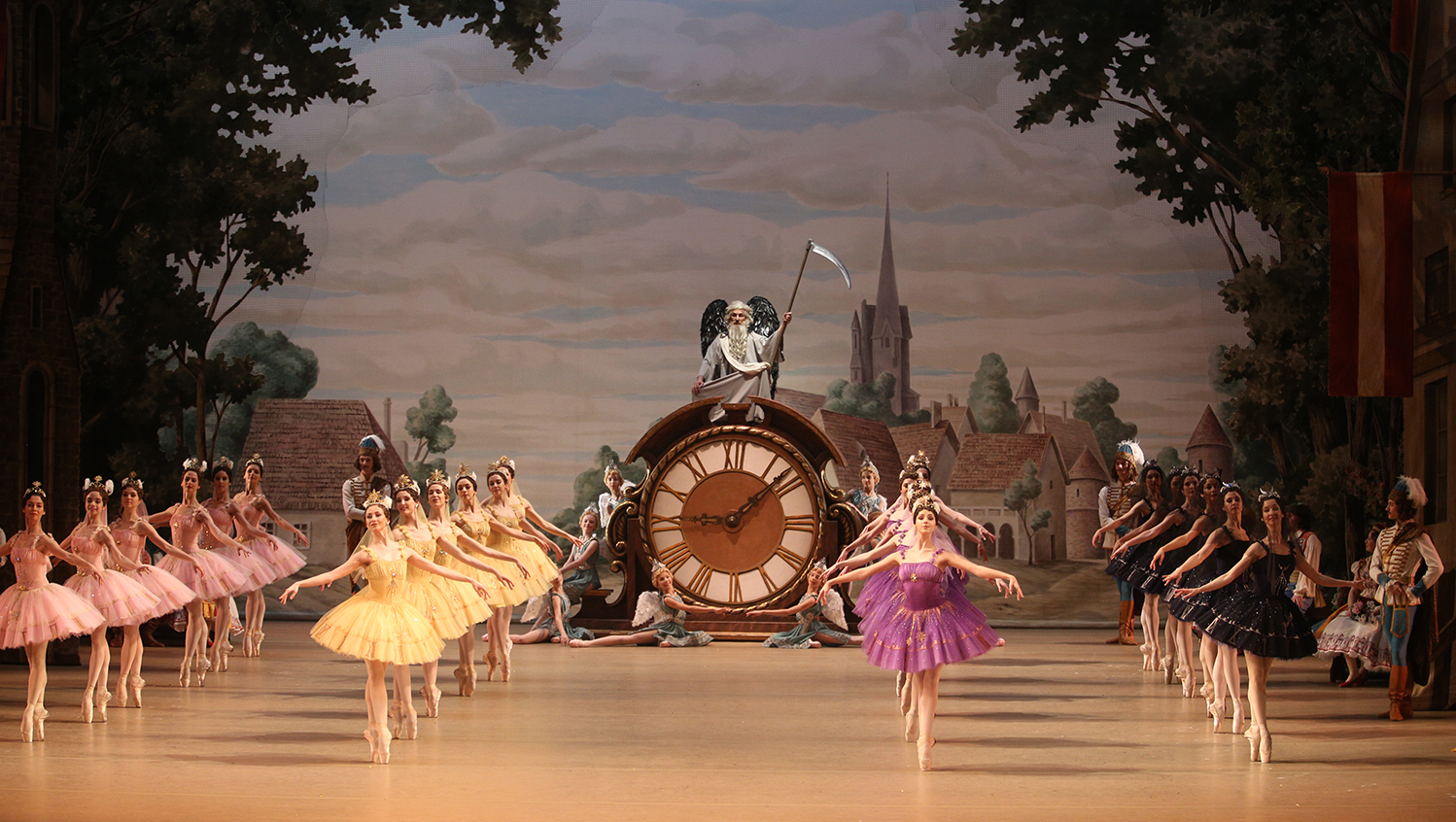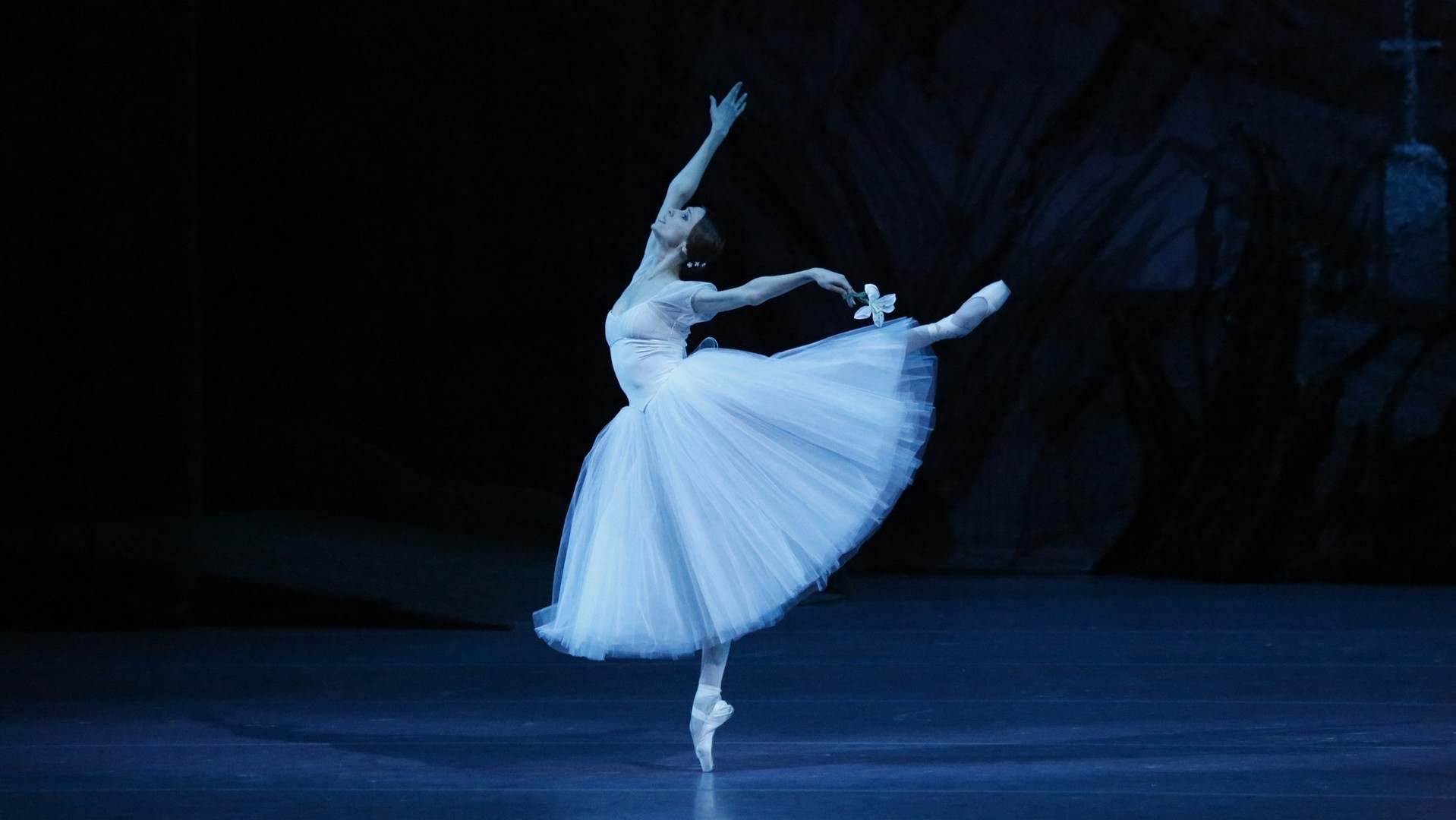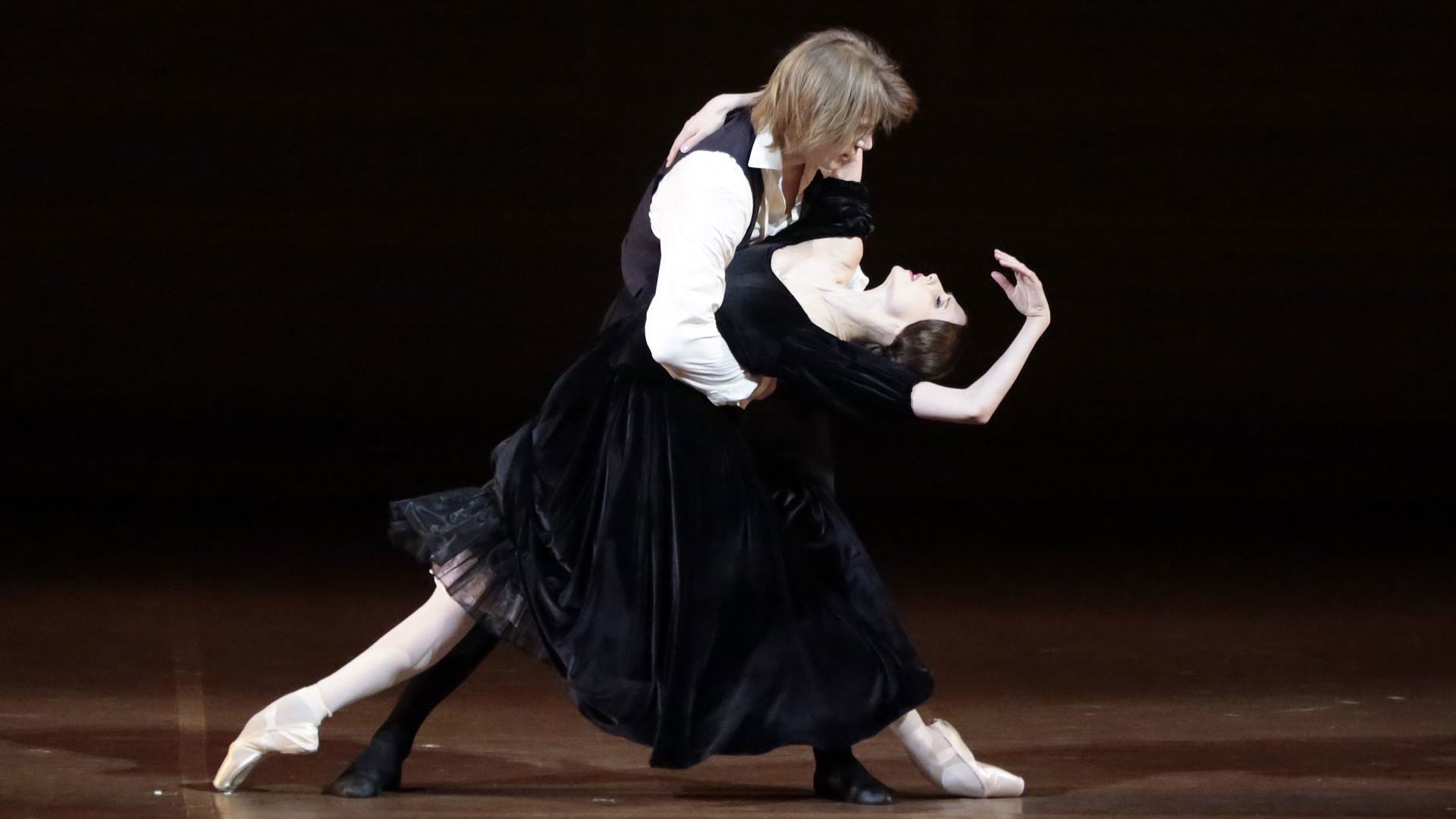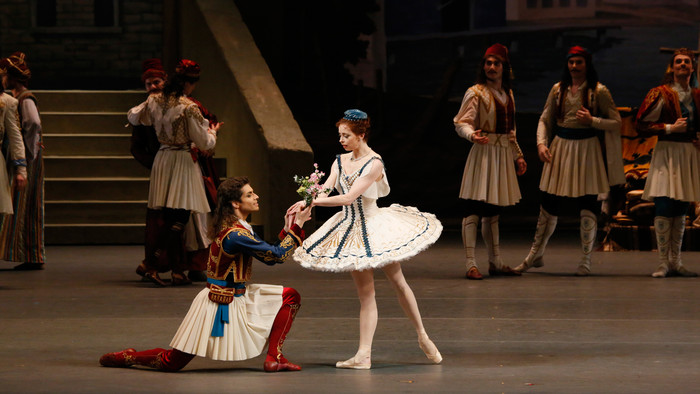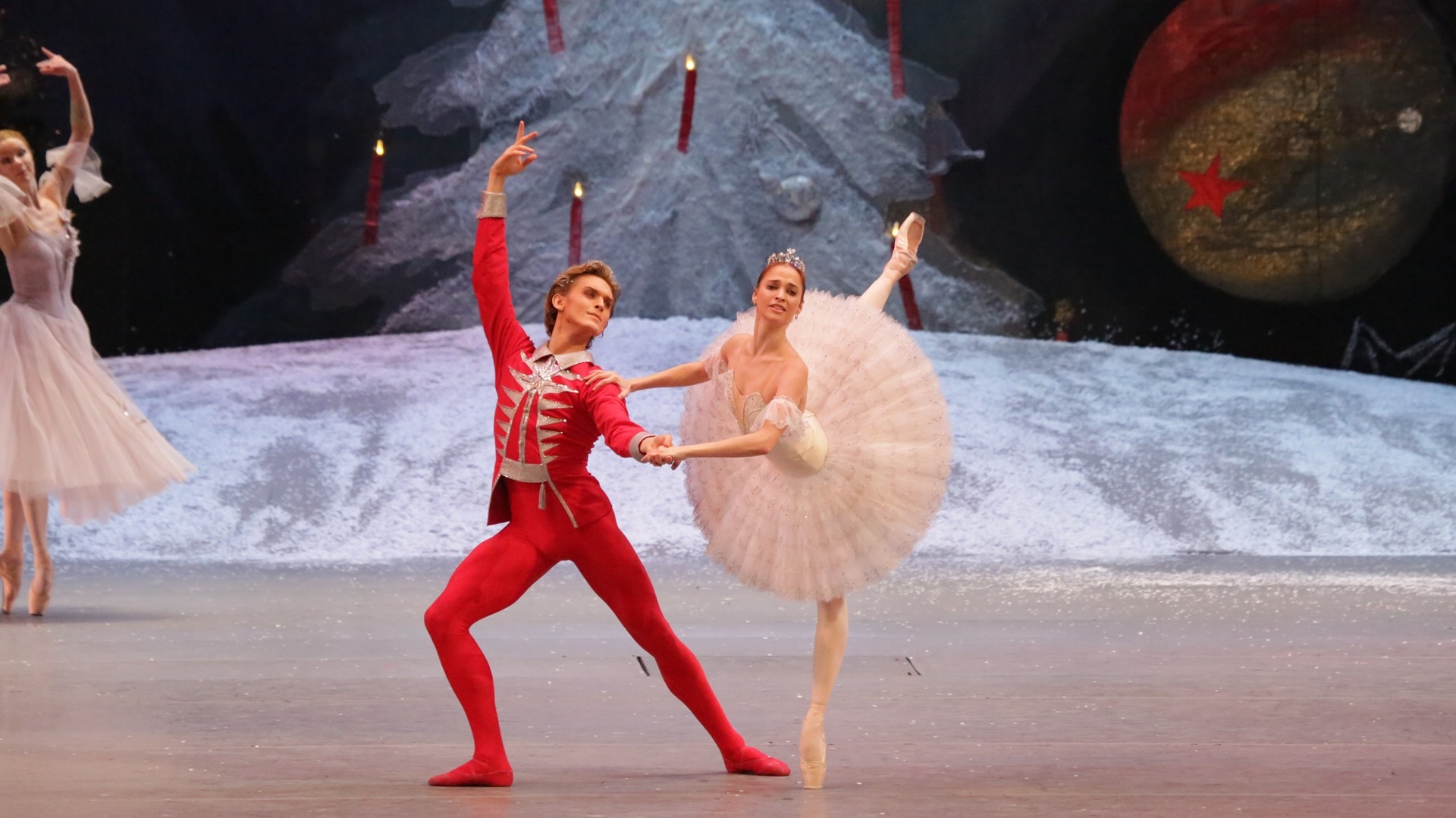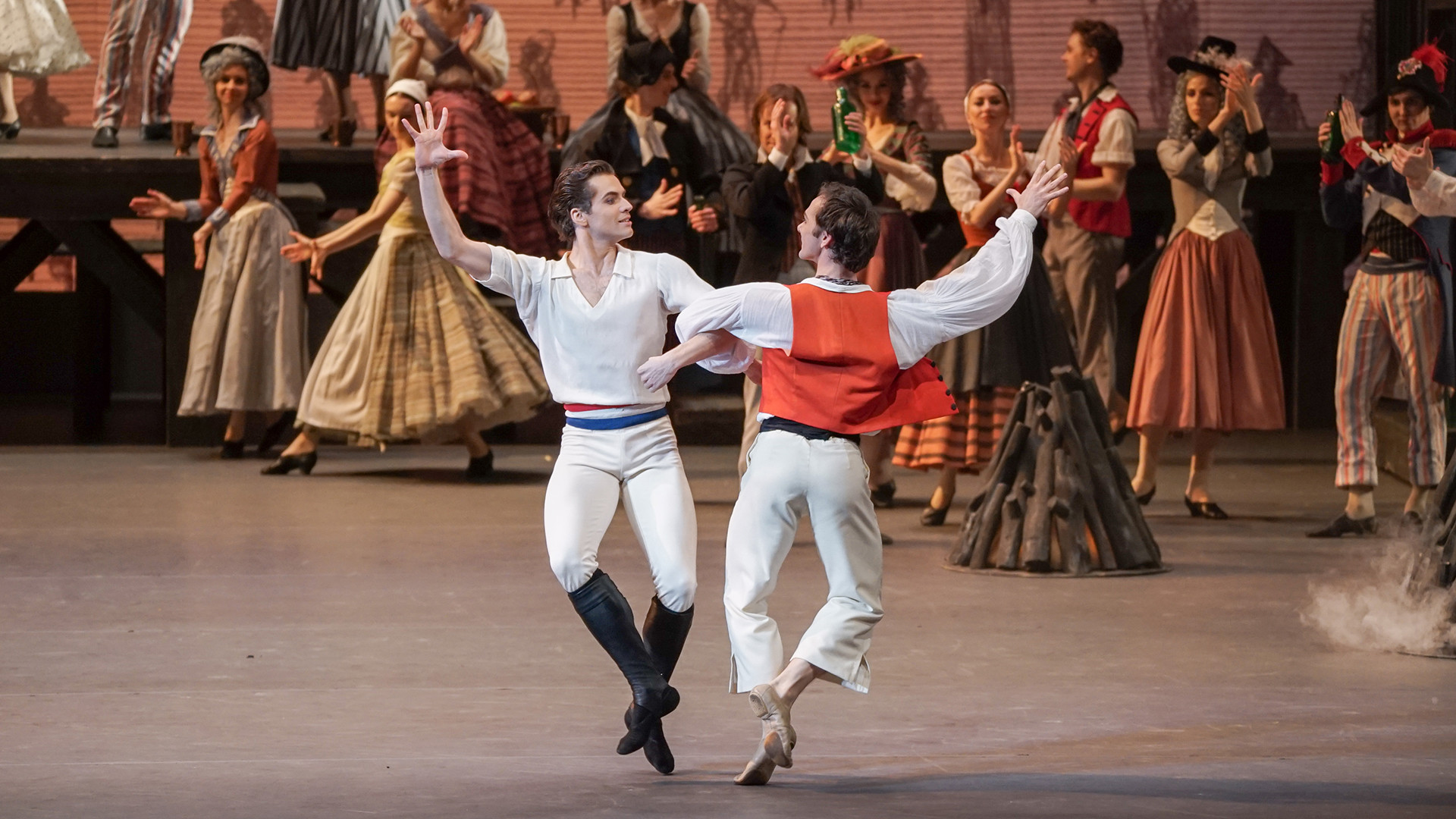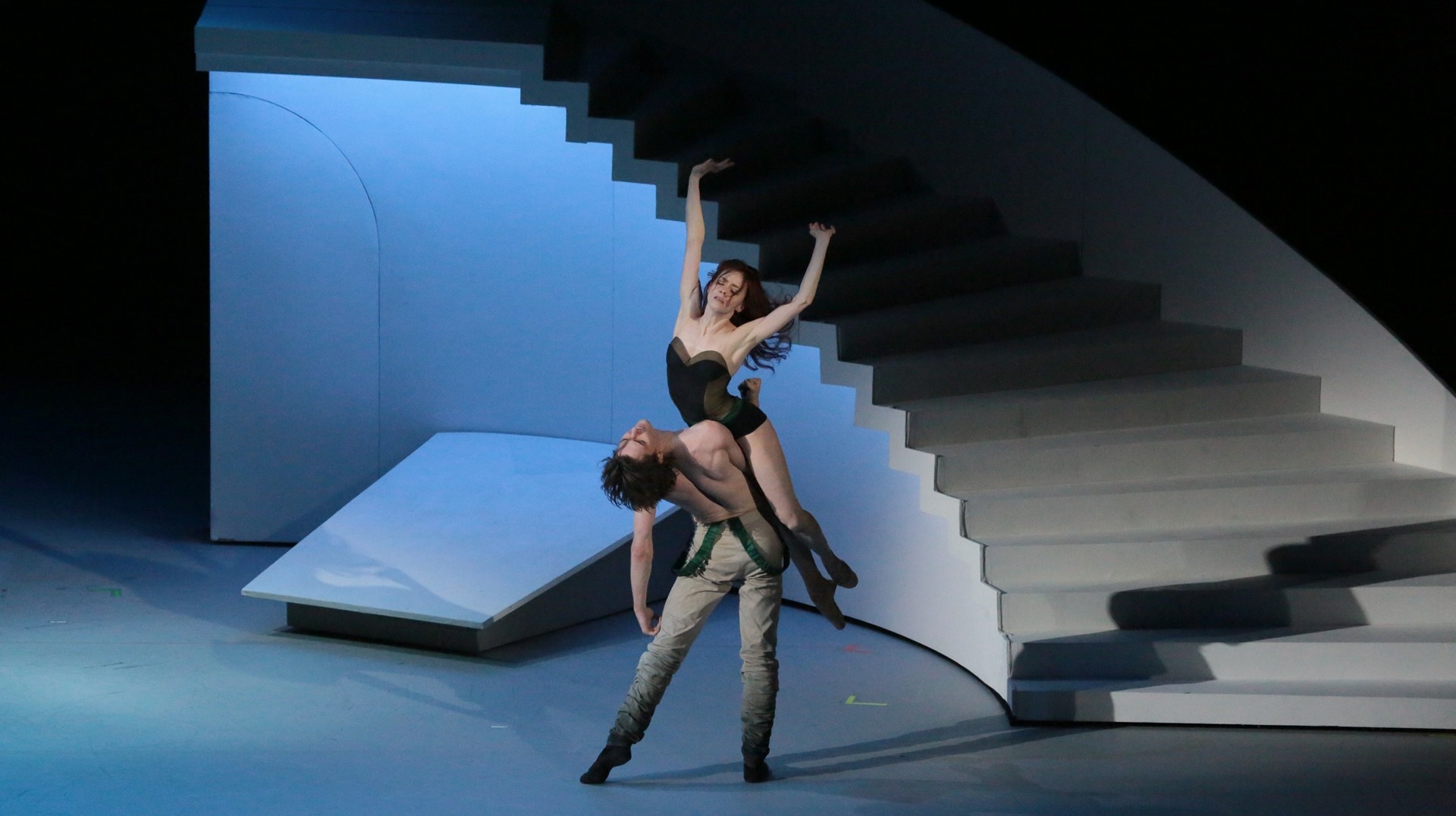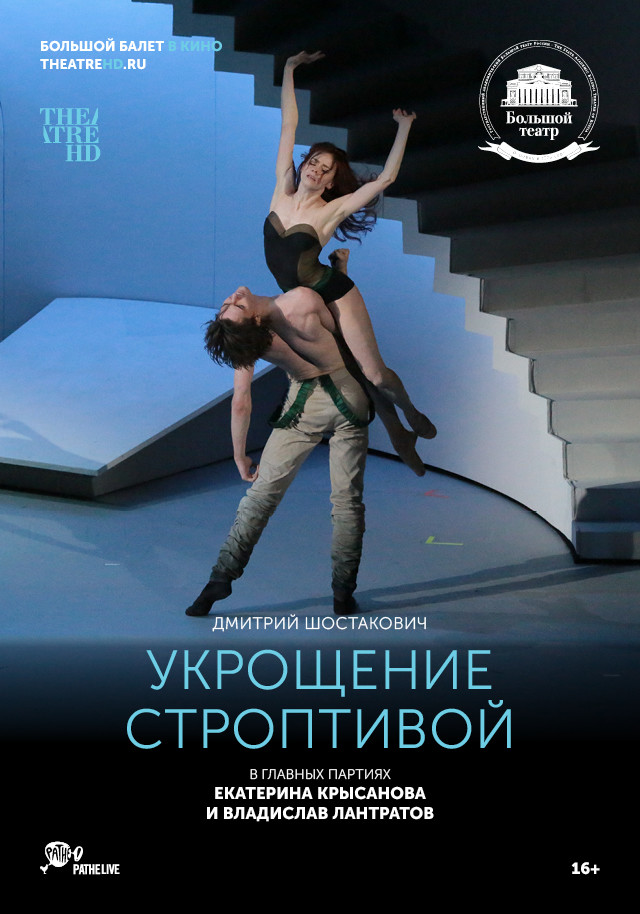
Dmitri Shostakovich
The Taming of the Shrew
Укрощение строптивой
Jean-Christophe Maillot’s production of The Taming of the Shrew is a funny and fast-witted comedy exclusive to the Bolshoi Theatre. This brilliantly choreographed ballet brings out the athleticism and vibrancy, and tackles the search for one’s better half. The Taming of the Shrew earned three Golden Mask awards for this bold rethinking of Shakespeare. The ballet starring Vladislav Lantratov and Ekaterina Krysanova is a wonderfully entertaining must-see production.
Actors
Катарина
Петруччо
Бьянка
Люченцио
Гортензио
Гремио
Вдова
Баптиста
Экономка
Грумио
Crew
Assistant to Choreographer: Bernice Coppieters
Set Designer: Ernest Pignon-Ernest
Costume Designer: Augustin Maillot
Assistant to Costume Designer: Jean-Michel Laîné
Lighting & Video Projection: Dominique Drillot
Assistant: Stefani Matthieu
Dramatist: Jean Rouaud
Répétiteurs: Yan Godovsky, Victor Barykin, Josu Zabala
Music Director: Igor Dronov
ARGUMENT
Rather than a macho handbook, The Taming of the Shrew can be construed as an encounter between two forces of nature, who recognise one another at last. If they are abrupt, obnoxious, it stems from their solitude; they are fundamentally different from the society they live in, albatrosses among sparrows, and their excesses signal that they have yet to find a man (or a woman) who can measure up to them. Their love is out of the ordinary: while Petruchio could appear to be interested only in Baptista’s fortune, once the ink is dry on their marriage certificate, he doesn’t let go of Katharina. If he is interested, it’s by this woman; the real dowry, the actual gold mine, it’s her. He still needs to put her through a series of challenges to make sure that he wasn’t mistaken, that they are right for each other — measure for measure, so to speak. He was right. So was she. If she gives in to her husband’s demands, it’s not because she has found her master, but because she has met her match. Her submissiveness is an act. It hardly matters whether or not the sun is the moon, because the two of them have their own, extra-ordinary light. Petruchio isn’t fooled by by his wife’s new attitude. For the outside world, however, the prevalent social norms are safe. Everyone can breathe a sigh of relief: even the most reluctant among them have complied. In truth, Katharina and Petruchio play their parts in perfect harmony, and their singular tune sets them apart in what is a game of artifice.
THE CHARACTERS
Baptista is a rich gentleman who has two daughters: Katharina and Bianca. All would be well if the traditions of the time didn’t force him to marry his elder daughter first, when all the suitors queueing up at his door are interested solely in the agreeable Bianca. His daughters’ happiness doesn’t matter much to him: what he really wants is to have sons-in-law. Based on Katharina’s behaviour, however, he despairs of it ever happening.
Katharina has a comfortable dowry which ought to attract potential husbands, but she is also endowed with an attitude that frightens them off. No one knows what her violence hides, but she despises her sister’s bland suitors. Nothing seems to be good enough for her. Is hers an acute case of misanthropy or a singularly demanding character? Unbridled, Katharina lives on the edge.
Bianca, Baptista’s younger daughter, is hostage to Katharina‘s behaviour. As long as her sister keeps rejecting potential husbands, her many suitors will stay out of reach. The situation is cruel, because Bianca is as attractive as her sister is obnoxious. Hers are qualities that define the ideal woman in the society she lives in: fortune, grace, beauty and docility. Her sister will have none of it, however.
Gremio is an older gentleman, and could easily be one of the libidinous elders who spy on Susanna while she is bathing in the Book of Daniel. For him, the violent Katharina could never be Susanna, because she would have driven the voyeurs away ruthlessly. His Susanna is the chaste Bianca. Gremio’s appearance is off-putting, yet it doesn’t seem to hold him back as he attempts to woo her; he is living proof that money can distort one’s self-perception.
Hortensio, another one of Bianca’s suitors, is a dandy mainly concerned with himself and the rituals of high society. His interest is Bianca is mostly superficial, but he is the one who brings in his rude, boorish friend Petruchio, who may be able to solve the problem at hand.
Lucentio is a rich, idle youth. Well-bred and very charming, he could even fool people into believing he is well-read. He and Bianca come from the same world, they are the same age, and share the same yearning in love. As Juliette Greco once sang: "Let’s marry them, let’s marry them, I think they are very much alike".[1] Nobody would object to it — aside from Katharina.
Petruchio: There comes the monster — the one Hortensio believes to be able to accept, if not seduce, the monstrous Katharina as his wife. Hortensio thinks Petruchio will have low expectations; he is mistaken, and evidently doesn’t understand the man he calls his friend. Nobody comes close to this seemingly vulgar, shameless man, however, because he is the only one who will “see” Katharina. And he sees her as his equal, as unconcerned with etiquette and norms as himself. Monsters may be alone in their clairvoyance, after all.
Grumio, Petruccio’s servant, is cowardly and servile. That’s what’s expected of him. He may also be an accomplice to his master’s tricks and schemes.
The Widow is hardly disconsolate, and has no intention of remaining a widow. She sets her conditions, however: her second husband needs to belong to her world and to be rich. She can put up with the rest. She soon sets her sights on Hortensio.
The Housekeeper has been running the household for so long that she ought to be able to lay claim to Baptista, but he cares solely about his daughters. Since the house will soon be empty and her services no longer needed, she is wearily willing to accept Gremio’s advances. She may not love him, but it means she will be able to live comfortably and marry into the upper class, whose superiority is based on arrogance and money.
Part I
In the spacious house of the wealthy Baptista, the servants are mocking the masters in their absence: they mimic Baptista, the father, who is struggling to marry his elder daughter — Katharina, a fury — and denying the suitors of the younger one — Bianca, a goody two-shoes — who are required to wait. Baptista returns unexpectedly, putting an abrupt end to the servants’ comedy.
We meet his two daughters. The younger one, Bianca, who is the object of everyone’s attention, is as gracious as her sister Katharina is difficult and ill-tempered: nothing and no one seems to find grace in her eyes, except perhaps her father. She is the Shrew.
Attracted by Bianca’s beauty, the suitors show up at Baptista’s house. There are three of them: the libidinous Gremio, the conceited Hortensio and the charming Lucentio. They parade in front of Bianca and attempt to get her attention. Quite logically, Bianca prefers the charming Lucentio. Carried away by her budding feelings, she dances as if in a dream. Her father is intent on doing things according to custom. Daughters are to be married in the right order, starting with the eldest, and he won’t approve a proposal for Bianca as long as Katharina isn’t wed. Accordingly, he brings his elder daughter in and introduces her to the suitors in the hope that one of them will be interested in her, but Katharina is hardly encouraging. She does everything she can to repel them, and clearly prefers to stay alone with her father instead of giving in to the comedy of marriage.
Hence a pressing question for the suitors: how can they get rid of her? Hortensio suddenly remembers that he has a friend who is unlikely to be too demanding as long as the wedding brings a nice dowry, and who could help clear them by marrying Katharina. His name is Petruchio; he is as boorish as Katharina is ill-tempered, and the prospect of additional income should be enough for Katharina to appeal to him.
Their saviour arrives at last. Where is his fiancée? She who seems to breathe fire? Right, he will make the best of it. Challenged to seduce Katharina, he pretends to woo her and takes every rebuff as encouragement to continue. The two monsters launch into a duel where Petruchio pretends to be impervious to Katharina’s attitude, while she actively tries to make herself even less attractive. At one point, however, when he kisses her, she slips into a daydream — perhaps love can be sweet after all? Lost in her thoughts, Katharina briefly lets herself go — and immediately denounces it as a meaningless moment of weakness. It’s too late, however: she has shown her sensitive side, and there is a glimmer of hope in her. Perhaps for that reason, she accepts the proposal of that strangely considerate boor, Petruchio.
Her decision opens the way for the suitors, who are finally allowed to woo the beautiful Bianca.
The first to go is Gremio. He brings a magnificent necklace as a gift for Bianca, but she isn’t interested; not even the finest jewellery could allure her where Gremio is concerned. The Housekeeper, who might soon be out of a position, is watching the scene. She sees an opportunity with Gremio and seizes it: since he doesn’t stand a chance with Bianca, she won’t let him escape.
Next up is Hortensio. He doesn’t need to bring a gift: his person is present enough. He is the gift. Bianca remains impervious to his self-assurance — he is fundamentally self-sufficient — In view of Bianca’s reticence and her lack of susceptibility to his complacency — and this time a widow, a friend of the family yearning to be back in the game, sets her sights on Hortensio.
Lucentio is last. From an affluent family, he is a worthy suitor in the eyes of Baptista, and all boyish charm in Bianca’s. As a token of his love, he presents her with a collection of poems. If all goes well, theirs will be the next wedding.
All is not well for Katharina, however, as she waits for the arrival of her fiancé, torn between rage, melancholy and despair. The wedding celebrations have started. Baptista attempts to help his elder daughter cope with her groom’s defection while the rest of the party is having fun. Grumio makes an appearance at last, and launches into an act that bodes well for his master’s offhandedness. It becomes clear that his master has more urgent matters to attend to than his wedding; he will come when he feels like it, and has drunk to his heart’s content.
When he appears at last, instead of going straight to his bride, he makes her wait yet again, and is clearly in no hurry to get married. Since that’s what he’s there for, he finally deigns to address his future wife. As everyone waits to see what gift he has brought for Katharina, he snatches the necklace meant for Bianca and puts it around Katharina’s neck. The humiliation is too cruel for the Shrew, who slaps Petruchio.
The assembly freezes in astonishment. The foolish, rebellious bride has spoiled the festivities. The vexed groom raises his hand to her, and seems on the verge on beating her. The party is over. Men like him, willing to take on such a virago, are few and far between.
Petruchio considers slapping her back and leaving on the spot, but changes his mind. This woman, he thinks to himself, this woman and her temper could have been made like me, for me. But she will need to learn a few things — first, that no one treats me like this. He drags her like a rag doll and leaves with her as the guests look on, aghast, and wonder if they haven’t pushed it a little far. It’s looking bad for the Shrew. Still, it’s over and done with. Let’s dance.
Part II
A strange honeymoon begins that takes the newlyweds to Petruchio’s house through a menacing forest. a trip that will take the newly-wed couple, through an uncanny forest, to Petruchio’s home. The exhausted Katharina can barely stand up and begs for mercy; she struggles, yearns to stop and rest, but her husband is adamant that he will leave her in the middle of nowhere if she doesn’t keep up. Katharina, who knows only the comfort of her father’s home, is so scared tha she stands up, but soon implores him again. Her husband doesn’t yield. At that point the little group (inevitably, the couple is accompanied by Grumio, who has just disappeared) is attacked by bandits, who brutalise Katharina and steal her necklace. Petruchio remains impervious to his wife’s cries for help. He seems to believe she can fend off for herself, or that it’s as good an opportunity as another to test her. He finally intervenes and scares off the attackers, among whom we see Grumio, who takes off his mask. A servant scheming is hardly surprising, but could his master be an accomplice? Did he stage the attack to put Katharina further on edge? Nothing confirms it yet.
They finally make it to Petruchio’s abode, which is far less opulent than Baptista’s. Katharina, alone, exhausted, fully aware of what life holds for her now, gives in to despair, and ultimately faints. Petruchio, who was watching her, rushes to her side and carries her tenderly to the bed; marvelling at her courage, her austere beauty, he lets his affection and desire show as she sleeps. When she regains consciousness, he promptly goes to sit on a bench and starts to act curiously. His house may not be very comfortable or its master very rich, but why is he warming himself at an imaginary fire? Intrigued, Katherina gets up and comes closer; when she sees that there is no fireplace, she wonders if her husband is mad. Then she understands that it is a game. Alright, there is a fireplace. She blows on the embers to rekindle the flames. The she offers imaginary tea to her husband. As the game continues, they discover each other. Their public masks come off. The war ends. Bewilderment of love.
In the morning, as the sun invades their bedroom, the lovers wake up peacefully, for the first time in their lives. They barely have time to enjoy the moment: Grumio brings a letter, an invitation to go back to Baptista’s house for Bianca and Lucentio’s wedding. The opportunity for Petruchio to show everyone the new Katharina.
Before they leave, Grumio returns the stolen necklace to his mistress. Petruchio acts surprised and lectures his servant. Is it just an act? Katharine grows suspicious and loses her temper again. Petruchio pretends to be offended, which leads to another confrontation — and reconciliation.
At Baptista’s, preparations are underway for the wedding of Bianca and Lucentio. Hortensio and the Widow, Gremio and the Housekeeper take the opportunity to make their relationships public. Everyone remembers the exit of the Shrew with her husband, and awaits them with curiosity.
Hence their surprise when Petruchio and Katharina show up elegantly dressed, affable, Petruchio almost friendly, Katharina seemingly submissive. The party rejoices and concludes they are an excellent influence on each other. They look every inch the well-heeled couple, and as a result, are invited to the tea ceremony.
Language
English, french
Runtime
1 hour 54 minutes with one intermission
Act 1
51 min
Intermission
19 min
Act 2
70 min
2015
16+
Theatre HD Live in Cinema 2017-2018: ballet
Весь сезонCan be interesting for you
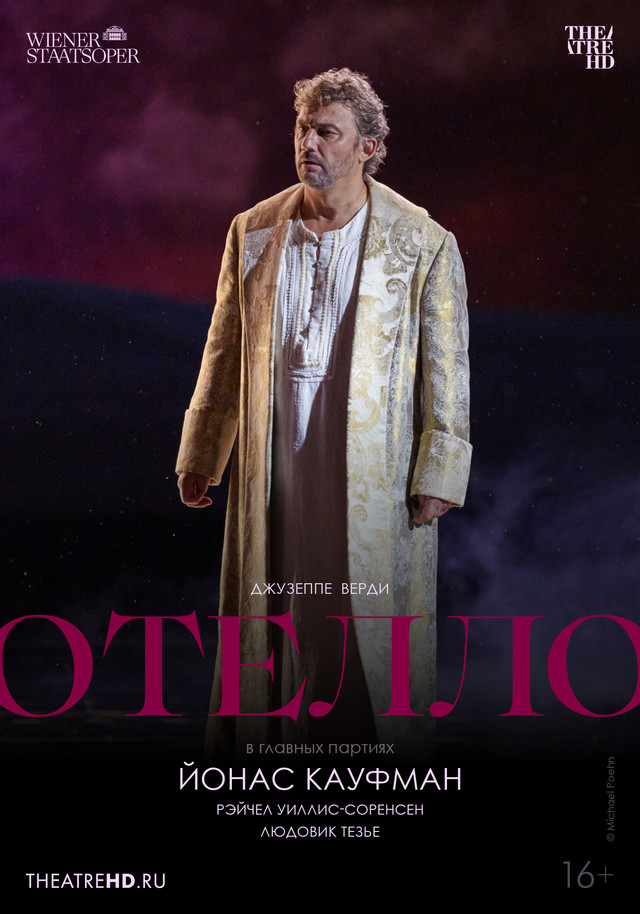
Otello: Kaufmann
4 March, Wednesday
19:00 Cinema Park DELUXE Piter – Raduga
Language: Italian, russian subtitles




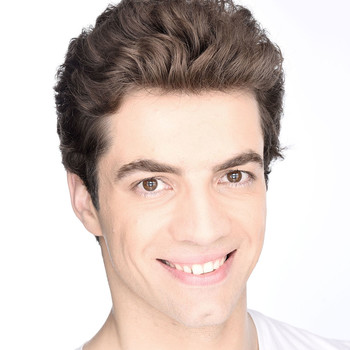



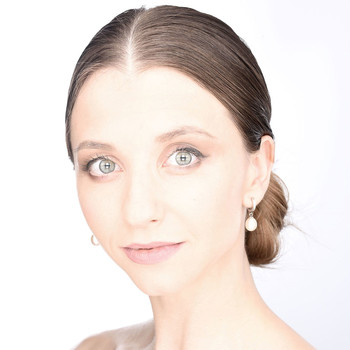

E.Fetisova.jpg)
